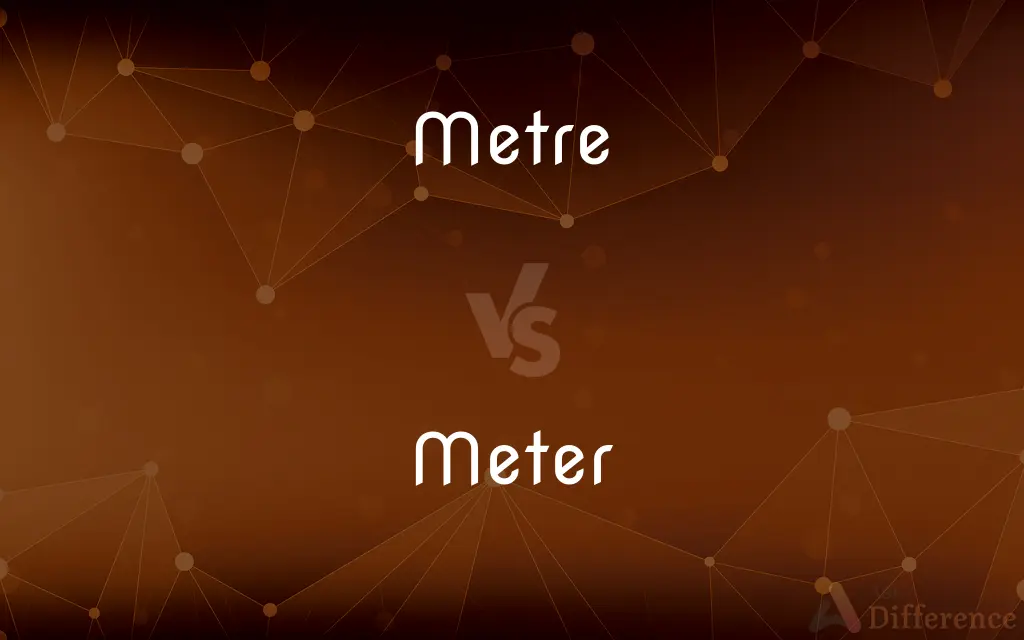Metre vs. Meter — What's the Difference?
Edited by Tayyaba Rehman — By Maham Liaqat — Updated on March 6, 2024
Metre refers to the unit of length in the metric system, while meter is the American spelling for the same unit or a device measuring quantities.

Difference Between Metre and Meter
Table of Contents
ADVERTISEMENT
Key Differences
The term "metre" is used primarily in British English to denote the basic unit of length in the International System of Units (SI). It is defined as the distance light travels in a vacuum in 1/299,792,458 seconds. On the other hand, "meter" in American English not only refers to the same unit of length but is also used to denote devices that measure and record the quantity of a particular substance or phenomenon, such as a water meter or a gas meter.
While "metre" is strictly related to measurements of length and distance in countries using British English, "meter" in the context of American English can lead to ambiguity since it may refer to a measuring device in various contexts, such as energy consumption or parking time.
The spelling difference between "metre" and "meter" reflects broader differences between British and American English, affecting not just spelling but also word usage and pronunciation. Whereas "metre" aligns with other British spellings that retain the "-re" ending, such as "centre" or "fibre," "meter" fits the American preference for "-er" endings, like "center" or "fiber."
In scientific and technical writing, the distinction between "metre" as a unit of measurement and "meter" as a measuring device is maintained across both British and American English. However, the American spelling "meter" is universally used in scientific contexts when referring to the unit of length, showcasing a preference for standardization in global scientific communication.
Despite these differences, the fundamental concept behind both "metre" and "meter" remains the same, highlighting the importance of context and regional spelling conventions in English. Both terms ultimately derive from the Greek word "metron," meaning measure, underscoring the shared linguistic roots despite variations in usage and spelling.
ADVERTISEMENT
Comparison Chart
Spelling
Preferred in British English
Preferred in American English
Usage
Refers exclusively to the unit of length
Refers to the unit of length and measuring devices
Context
Used in countries following British English norms
Used in the United States and for measuring devices
Pronunciation
Generally the same in both British and American English
Generally the same in both British and American English
Etymology
From Greek "metron" for measure
From Greek "metron" for measure
Compare with Definitions
Metre
The standard spelling in British English.
British road signs indicate speed limits in metres per second.
Meter
The American English spelling for the unit of length.
NASA uses meters to describe distances on Mars.
Metre
The fundamental unit of length in the SI system.
Scientists use the metre to measure distances in space.
Meter
A device for measuring and recording the quantity of a substance.
The electric meter records our electricity usage.
Metre
Used worldwide in scientific and standard measurements.
The World Athletics Championships records track events in metres.
Meter
In scientific contexts, it refers to the SI unit of length.
Light years are measured in astronomical units, not meters.
Metre
Defined based on the distance light travels in a vacuum.
One metre is the distance light travels in 1/299,792,458 of a second.
Meter
The preferred term for measuring devices in American English.
You need to feed the parking meter to avoid a ticket.
Metre
A unit of length in the metric system equal to 100 centimeters.
The Eiffel Tower is about 300 metres tall.
Meter
Used in expressions related to rhythm and measurement in music and poetry.
The poem's meter gives it a rhythmic structure.
Metre
The metre (Commonwealth spelling) or meter (American spelling; see spelling differences) (from the French unit mètre, from the Greek noun μέτρον, "measure", and cognate with Sanskrit mita, meaning "measured") is the base unit of length in the International System of Units (SI). The SI unit symbol is m.
Meter
The measured arrangement of words in poetry, as by accentual rhythm, syllabic quantity, or the number of syllables in a line.
Metre
The basic unit of length in the International System of Units (SI: Système International d'Unités), equal to the distance travelled by light in a vacuum in 1/299 792 458 seconds. The metre is equal to 127 (approximately 39.37) imperial inches.
Meter
The international standard unit of length, approximately equivalent to 39.37 inches. It was redefined in 1983 as the distance traveled by light in a vacuum in 1/299,792,458 of a second. See Table at measurement.
Metre
The basic unit of length adopted under the Systeme International d'Unites (approximately 1.094 yards)
Meter
To supply in a measured or regulated amount
Metered the allotted gasoline to each vehicle.
Meter
(American spelling) The base unit of length in the International System of Units (SI), conceived as 1/10,000,000 of the distance from the North Pole to the Equator, and now defined as the distance light will travel in a vacuum in 1/299,792,458 seconds.
Meter
A measure of length, equal to 39.37 English inches, the standard of linear measure in the metric system of weights and measures. It was intended to be, and is very nearly, the ten millionth part of the distance from the equator to the north pole, as ascertained by actual measurement of an arc of a meridian. See Metric system, under Metric.
Meter
The basic unit of length adopted under the Systeme International d'Unites (approximately 1.094 yards)
Common Curiosities
What is a meter?
A meter can refer to the American English spelling of the unit of length or a device that measures a quantity of something.
Are metre and meter pronounced the same?
Yes, in most English-speaking regions, the pronunciation of "metre" and "meter" is identical.
Can the terms metre and meter be used interchangeably?
In the context of length measurement, yes, but in American English, "meter" can also refer to a measuring device.
Is "meter" accepted in British English?
Yes, when referring to devices that measure (e.g., gas meter), but not typically for the unit of length.
Why do British and American English use different spellings?
The spelling differences reflect historical and linguistic developments unique to British and American English.
What is a metre?
A metre is the basic unit of length in the metric system, equivalent to 100 centimeters.
Has the definition of a metre changed over time?
Yes, the definition has evolved with advancements in measurement precision.
Do "metre" and "meter" have the same origin?
Yes, both terms derive from the Greek word "metron," meaning measure.
Is "metre" used in American English?
Rarely, as "meter" is the preferred spelling for both the unit of length and measuring devices.
How do educational systems teach the concept of metre/meter?
It varies, with British English-speaking countries teaching "metre" and American English-speaking countries teaching "meter."
How is a metre defined?
A metre is defined as the distance light travels in a vacuum in 1/299,792,458 seconds.
Are there contexts where only "metre" or "meter" is appropriate?
Yes, in scientific and technical writing, the distinction is maintained for clarity.
Can the use of "metre" or "meter" affect comprehension?
Potentially, especially in international contexts where one term might be preferred over the other.
Is the metre/meter distinction important in science?
Yes, for clarity and precision in communication, though "meter" is universally used in scientific contexts to refer to the unit of length.
What devices might be called a meter?
Devices like electric meters, water meters, and parking meters measure consumption or time.
Share Your Discovery

Previous Comparison
Monetary vs. Monetarily
Next Comparison
Colleague vs. FellowAuthor Spotlight
Written by
Maham LiaqatEdited by
Tayyaba RehmanTayyaba Rehman is a distinguished writer, currently serving as a primary contributor to askdifference.com. As a researcher in semantics and etymology, Tayyaba's passion for the complexity of languages and their distinctions has found a perfect home on the platform. Tayyaba delves into the intricacies of language, distinguishing between commonly confused words and phrases, thereby providing clarity for readers worldwide.















































